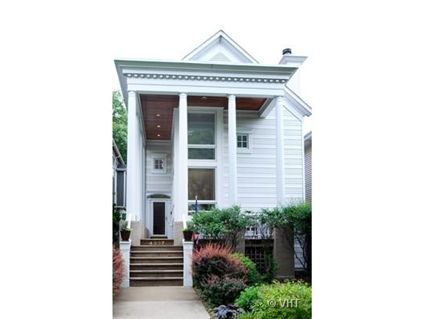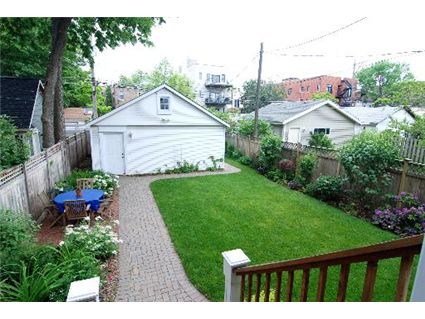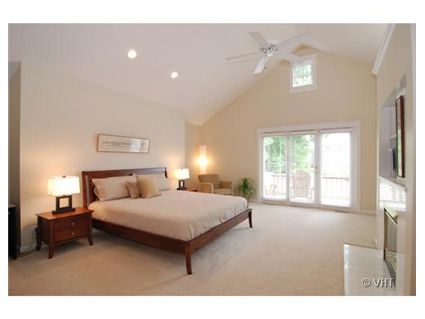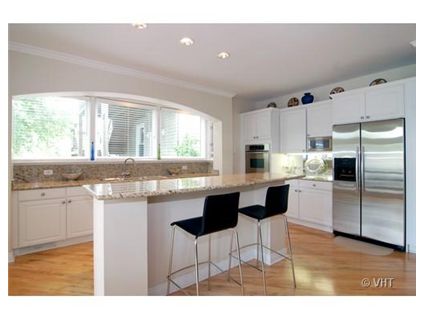Ravenswood Single Family Home With Contemporary Interior Sells: 4337 N. Paulina
We’ve chattered about this 4-bedroom single family home on an oversized lot at 4337 N. Paulina in Ravenswood several times.

See our November 2009 chatter and pictures here.
It has now sold for $125,000 under the August 2005 purchase price.
The house had an open concept contemporary interior with skylights. It also had a lovely backyard with a 2.5-car garage.



Timothy Sheahan at Conlon Real Estate had the listing.
4337 N. Paulina: 4 bedrooms, 3.5 baths, 2.5 car garage, no square footage listed
- Sold in April 1988 for $56,500
- Sold in March 2000 for $700,000
- Sold in August 2005 for $955,000
- Originally listed in May 2008 for $1.099 million
- Listing cancelled in October 2008
- Re-listed in June 2009 for $999,900
- Reduced
- Was listed in August 2009 at $949,000
- Reduced
- Was listed in late August 2009 for $899,000
- Was listed in November 2009 for $899,000
- Sold in December 2009 for $830,000
- Taxes of $11,471
- Central Air
- Bedroom #1: 17×21
- Bedroom #2: 16×14
- Bedroom #3: 11×12
- Bedroom #4: 10×11
Buyer got a good deal.
Still hate the front of the house and don’t love the proximity of school and Ashland.
Price is 1.75%/yr over 2000 price–less than the 2000 price (which I think was a *bit* high) in real $$.
How much do you think it would cost to rent this place? I don’t call buying at this price a good deal. Buy/ rent equation is still way out of whack.
This house sold because it’s basically the only 4 bd SFH for sale in the neighborhood under a million. It’s a nice hood, walkable to the el, nice block – but apparently if you want a family sized SFH you’re going to need nearly million dollars.
There is also a distinct lack of inventory in the hood. There are lots of condos for sale, lots of million plus new constructions/rehabs, but almost no (actually none!) so called regular owner occupied SFH’s listed. None one wants to sell in this terrible market unless they have to. And this guy is setting the comps showing that SFH’s better be special to be worth a cool mil.
This however, is the comp setter for the ‘hood:
http://www.redfin.com/IL/Chicago/3633-N-Hermitage-Ave-60613/home/13387847
I personally know people who bought cookie cutter homes exactly like this for well over a cool million in between 2003-2008.
$939k for this place is literally a comp killer. Nobody is going to pay over a million for one of these newer constructions in Ravenswood ever again.
Ever? Yeah um, no.
“How much do you think it would cost to rent this place?”
I feel that the markets for SFH rentals and purchases (at least at “premium” prices, at least apart from Cali and Bo-NY-Wash) are separate–you will find very few SFH renters who have a “staying in this metro” for more than ~3 years and most (sensible) SFH buyers think they are staying for less than 7+.
That might not be you, but then you’re one of those people that make teh Groove start yelling. And the outliers don’t set the market. The market for SFHs *should* be driven by O/Os, with reasaonble time horizons.
Buyer paid *below* 2000 price in real $$. Even if the 2000 price was 10% high (imo, it was), still paying ~10-years-ago price for an SFH you plan to be in for a decade.
Now, if this buyer is *planning* to sell in 3-4 years, no, he didn’t get a “good” deal–or at least not good enough to make a net, real $$ profit.
HD: “[3633 N Hermitage]”
Hermitage there is a short lot block. Lot’s 25×108. It’s the difference b/t having a okay city yard and absolutely none. That someone would pay $939k to be in Blaine sez a lot. Makes me more sure that the Grace cottage’s biggest problem is Hamilton.
Sonies: “Ever? Yeah um, no”
In real $$? Maybe.
In nominal $$? Of course you’re right and HD’s wrong.
Ever might be an exaggeration but definitely for the foreseeable future.
Here’s a similar house in the same hood. $1.175 million in March 2008, now worth less than a million. OUCH!!!
http://www.redfin.com/IL/Chicago/1921-W-Warner-Ave-60613/home/12596889
Like I said about, very few SFH’s listed less than a mil in ravenswood because people are underwater or nobody wants to sell in a down market (or simply can’t afford to take a large hit!)
So when 4337 N. Paulina hits the market, 4 bed, less than a million, somebody is going to ‘snap’ it up.
Even two flats with 6 beds are selling in the upper 500’s and lower 600’s in this hood.
“Sonies on December 18th, 2009 at 1:02 pm
Ever? Yeah um, no.
“
“Even two flats with 6 beds are selling in the upper 500’s and lower 600’s in this hood. ”
Yeah, b/c they are either (a) conversion-to-sfh projects or (b) much smaller houses with a rental unit, which is underwritten rationally now. Even being fairly aggressive (ignoring taxes, maintenance/replacement, vacancy, using a low-ish cap rate) you can’t get a “typical” 2-flat to be “worth” more than mid-$500s.
“$1.175 million in March 2008, now worth less than a million.”
Based on … what, exactly? House doesn’t appear to be listed.
Because I said so.
No actually, IMHO (FWIW) – the lack of comps, the few comps that are available are all less than a million, and 3633 just a few blocks south, even though it’s on a slightly smaller lot and one less bed kills the comps on that entire type of home (square, brick, new, 4-5 beds, basement, 3.5 baths, etc). The financing is no man’s land and these were worth a million only during the bubble; it took a while for this bubble to pop but it sure has.
““$1.175 million in March 2008, now worth less than a million.”
Based on … what, exactly? House doesn’t appear to be listed.”
HD:
I *think* I agree with you, even tho the Hermitage house has “curb repel” while the Warner house is merely “ehn”.
Of course, I think the *structures* are worth (basically) the same as they were, it’s just that the land is worth at least 1/3 less. So, the Warner house–at ~4200 SF, including the basement–was (say, e.g.,) $525k for the structure, $650k for the land. And now, it’s $525k (@ $125/sf) for the structure and (max) $450k (and quite probably $350k) for the land. It’s a big problem for owners.
To the masses: This seems to be a comparable SFH in the area. Thoughts?
http://www.redfin.com/IL/Chicago/4120-N-Hermitage-Ave-60613/home/13389556
anon (tfo) – do you think that land was as equally overvauled as the housing it sat on during the bubble?
HD: give it time, we are starting to see high $400’s for 2 flats, they will continue to move back dowwards too
“Even two flats with 6 beds are selling in the upper 500’s and lower 600’s in this hood. “
“anon (tfo) – do you think that land was as equally overvauled as the housing it sat on during the bubble?”
How much has the cost of constructing a new house dropped since 2006/07?
How much has demand for teardowns dropped?
Many houses were “overimproved” based on the cost of the land–more expensive finishes put in to justify $1mm+ price tags. And the builder was certainly rolling in profit to the asking price, so one can justify stripping that out of the replacement cost.
But I haven’t heard of building costs dropping dramatically–if you know a general willing to undertake some significant work for 25-30% less than they would have charged two years ago, please let me know, as I would be interested.
Near me a frame two-flat (on a wider lot–extra 5′) is languishing at 25% less than teardowns within 100 yards sold for as recently as last year. I bet the construction costs would be essentially the same as they would have been in 2006.
The problem with large houses is that the carry costs are too high. The largest discount to replacement costs will show up in bigger houses. Everyone on here seems to rag on 2/2s in the city, but IMHO, 2/2s right downtown will be in demand because 1) you don’t really need a car b/c you can walk to work 2) you save a lot of money on energy costs not to mention LESS furniture 3) Financing costs will stay relatively low for conforming deals (i.e. $400k 2 beddys). My guess is that 2 bedrooms in the city won’t go much below $275-$300/sf (at least for the solid, newer product that has little capital needs over the next 10 years and moderate assessments). Of course you’ll find comps below that, but don’t show me American Invsco comps at $200/sf. I want to see the Real Deal Holyfield comps at those levels. I don’t think they’re out there, and they never will be. In the meantime, larger SFH will continue the march downward as jumbo spreads outstrip conforming spreads – b/c it ain’t the Obama tool kit to keep $1MM homes affordable!
Speaking of 2-flats–there’s a great absurdity with a new listing on Bell–3719, listed for $699k, bought in Jul-05 for $575, and no obvious work done.
There two v. similar two-flats on Claremont (3710 (just u/c) and 3806) listed for ~$545k.
All three in Bell attendance area, all brick. The Claremont one’s share an alley w/ Western, which is a significant drawback.
Rent for these sorts of places seems to be ~$1300+/-.
So a smallish 1,000 sq ft 2/2 will be $275k-$300k plus a few hundred bucks for assessment and a few of hundred for taxes….so a reasonable PITI (after 20% down) will be $1,750 per month for a smallish 2/2 and $2,300 or $2,400 for a larger 1,500 sq ft, varying by location and finishes, of course. My figs above are close to rental parity based upon craigslist ads (not including the 10% craigslist discount). You know, you might be on to something, I need to do more calcs and research to flesh out your theory, but I don’t have the time today to do that.
“My guess is that 2 bedrooms in the city won’t go much below $275-$300/sf “
hd, you forgot the interest tax deduction
“My guess is that 2 bedrooms in the city won’t go much below $275-$300/sf “
Sure they will, it will happen when rates rise. In the event that the govt continues turning japanese and maintains ZIRP, they will also decline below that number in the coming lost decades.
“Sure they will, it will happen when rates rise. ”
Oh, G, did something especially nice happen to you today? Because there are a *ton* of 2/2 condos in non-Invsco buildings for sale for much less than $275 psf right now. And they’re within walking distance of the Loop.
Sure, if they’re in new-ish buildings, they’re mostly in the South Loop, but that wasn’t a stated exclusion.
I know, but those situations aren’t much better than being in AI properties. In fact, given that most AI props are in better locations and are experiencing rapid price corrections, some are currently better options than a lot of the SL.
Regardless, it’s awful vs worse however you rank those choices.
Anon/G: even in Japan’s lost decade (or I guess its been twenty years now) – check out home prices/condo prices, especially in the city. You might be shocked by what you find. Homes are priced in a given country’s fiat currency, which makes speaking in nominal terms (which most people do on this site) very dangerous and I urge caution for those who tend do to that.
Just trying to speak the truth – sort of like what Ron Paul might do.
“I know, but those situations aren’t much better than being in AI properties.”
But the statement was:
“My guess is that 2 bedrooms in the city won’t go much below $275-$300/sf (at least for the solid, newer product that has little capital needs over the next 10 years and moderate assessments). ”
If he’s limiting the universe of 2/2s to units in buildings that have recently sold for $500 psf or more, well, sure, I could get behind believing that *those* units won’t drop below $275-$300 psf, but that’s still 40% (and up) off of recent valuations.
That’s pretty ugly, still, and if it comes to pass, those buildings won’t be much better off than the typical SoLo building.
“Homes are priced in a given country’s fiat currency, which makes speaking in nominal terms … very dangerous”
How so? Because people won’t realize how much they are “losing”* by selling at “break even” ten years later?
*aka true cost of ownership.
howard:
I can’t find too much good stuff quickly, but unless this:
http://www.globalpropertyguide.com/Asia/Japan/Price-History
is completely wrong, Japanese housing prices have been falling in both nominal and real terms *every* year since 1992. And land prices had a good couple of years in the major cities, but are still *way, way, way* below the peak.
I just don’t see any evidence that Tokyo residential real estate has done anything but head down in price in both nominal and real terms for most of the past 17 years. For the limited purpose of this discussion, consider me a Missourian.
http://www.globalpropertyguide.com/Asia/Japan/square-meter-prices
But the point is that prices are still incredibly high, even after 20 years of deflation/disinflation. Does anybody on here think Tokyo housing should cost 4x that of Chicago? i.e. $1,300 psf vs. $300-$400 psf? What does Tokyo have on Chicago? Fine its a much bigger city with limited land, but does that justify a 4 handle? I’d give a 2x premium for land limitations MAX. Either Tokyo is way over-priced or Chicago is way under-priced. The global housing situation is dire, but Chicago isn’t really in that bad of shape relative to other cities. Ireland, Hong Kong, Spain – Now we’re talking major bubble. Chicago – I beg to differ.
Of course this in all in my own humble opinion and every view point is respected, however, i really think Chicago is a good buy once its placed in context.
I don’t see the context there. Comparing Chicago and Tokyo RE markets as a valuation model doesn’t make sense to me. Is there any element of supply or demand that they share?
How Chicago is a “good buy” because it “isn’t really in that bad of shape relative to other cities” also leaves me confused.
“Chicago is a good buy once its placed in context.”
Sure, sure. And I can agree with that, even. But you say Tokyo v Chicago shouldn’t be 4x? What was it in 1979–before the big Japan bubble (I really don’t know)?
Can you explain this, tho: “Homes are priced in a given country’s fiat currency, which makes speaking in nominal terms (which most people do on this site) very dangerous and I urge caution for those who tend do to that.”
cuz I still don’t get it. If we price Chicago RE in Gold, things have fallen off a cliff, but until most Chicagoans are paid in gold, that doesn’t much matter, except as a comparitive exercise.
And, yes, comparatively, Chicago is pretty darn cheap. And will likely stay that way, unless there is a *major* shift in city development law and policy.
I also find it humorous when anon defends these ridiculous valuations when comparing to other cities.
Anon the only reason POS’s like this and more generally other properties are horrendously overpriced in Chicago is idiot bankers giving insane leverage to the speculators.
Over the next several years you’re going to see two trends that don’t bode well for home ownership: people eschewing the status symbol of home ownership and the continued contraction of the financial sector as part of our economy (and the insane leverage those institutions provide).
Thanks for the links anon and Howard. Very interesting discussion. I often think about comparative valuation too.
The fact that Chicago sits adjacent to the most precious resource in the world (fresh water) only increases the value of land in my opinion. Especially compared to Tokyo, which is prone to earthquakes (yes, I know that we are too) and sits at 60 feet above sea level.
HD (3633 N Hermitage)
Just to clarify 3633 is in the Hamilton School district not Blaine, so no the Grace property problem is not because it is in Hamilton. In fact, with the hire of a new high profile principal at the school, it is attracting big buzz and people to the district.
Antarctica and Greenland also sit right atop the most precious resource in the world. I encourage people to speculate and buy property there for this very reason–I hear the views are phenomenal.
Tokyo is overpriced but Chicago is alsooverpriced,especially when you consider that there are a number of other midwestern cities within 500 miles that are ripe for redevelopment. Let Chicago get any more overpriced and overtaxed, and some enterprising soul with deep pockets and broad vision might go to work on restoring the dozen or so cities in the midwest and inland east that have been torn to shreds by 60 years of suburbanization and the mass movement out to the deserts of the southwest.
But then, Japan is vastly more overcrowded than the United States. Think about it- over 100 million people packed into a handful of tiny islands. This is a place where literally every spare inch of space is put to use, very artfully and imaginatively, I must say. I have to hand it to the Japanese for being able to manage to maintain the decencies and sustain their society given their extremely limited space and resources.
The United States, on the other hand, has vast amounts of open space, even in the eastern half of the country, where entire cities and towns replete with beautiful housing stock and ample water and space and fertile hinterlands lay ruined and abandoned. Take a look at the housing available in Detroit for anywhere from $10 for a beautiful gutted brick shell to $100K for a lovely vintage house with 3,000 sq ft. If we were as space and resource-constrained as is Japan, we’d damn well rebuild cities like Detroit and Cleveland and Cincinnati and Memphis and Rochester and Camden. And if we had any sense here, we’d do just that, instead of going out to the desert to build cities and demanding the taxpayers finance another dozen megadams to supply them with water.
Fresh water will always be the most important resource, one which will result in wars and mass migrations. More precious than gold, literally and figuratively.
You bring up the examples of Antartica & Greenland. You better believe that nations and corporations have been claiming rights to the water and other natural resources of both these places.
Yes, the availability and proximity of fresh water should play a primary role in deciding where to invest in real estate.
Danny, you better snap up some Michigan properties while you can. The entire state is a watershed in the great lakes. I will lend you a dollar to buy your first Detroit property!
HD… you can be assured I’m keeping my eye on property in both Michigan and Wisconsin. In particular, larger parcels of land as close as possible to the Lake (i.e. New Buffalo to St. Joes in Michigan; Pleasant Prairie to Racine in Wisconsin). Michigan in particular is struggling in this economy, and this is reflected in the housing prices.
I currently live (rent) near to the beach in Evanston, and can’t picture every living farther than walking distance to the water.
That doesn’t mean that everyone else shares my ideas, and values land in the same way as I do. But that’s what a truly free market is about.
Danny- you should really be looking in Detroit and Cleveland for decently priced homes near the water.
I actually agree with you. It could be the desire to be near that large source of fresh water that leads to the renaissance of the rust belt (isn’t Las Vegas scheduled to literally be nearly out of water in only 3 years? There will be severe rationing there.)
Eventually, people will wake up to the water shortages and will want to move back to where the sources are- and that’s the midwest and the Great Lakes.
Or they’ll build a big pipe to move the water from Lake Erie all the way to the southwest. The excuse will be that the great lakes belong to everyone, not a handful of flyover states.
“Eventually, people will wake up to the water shortages and will want to move back to where the sources are- and that’s the midwest and the Great Lakes.”
They can’t HD. There are treaties in place (with Canada) to prevent this from happening (amongst the states etc.) In fact, under current law, even if you live like 35 miles outside of Chicago you may not be able to have access to Lake Michigan water. There are certain restrictions in how far out you can be from the lake to access it.
I’m sure there are others on here with more knowledge of this and who know all the “rules” about it.
Personally, I could see a mass re-migration to the midwest (despite the winters!) when it becomes clear that water truly is precious.
Never say never. When the western states get very very thirsty, the government will find ways around the compact between Great Lakes states and provinces.
I know that a lot of people like to belittle Lake Michigan (calling it a pond or a cess pool), but I think it has some of the nicest beaches and best swimming anywhere. In the summertime, I try to jump in every day.
“I also find it humorous when anon defends these ridiculous valuations when comparing to other cities.”
Dude. Your reading comprehesion is suffering.
“To the masses: This seems to be a comparable SFH in the area. Thoughts?”
mgm: are you the contracted buyer on 4120? If it’s in good structural/mechanical shape, I think that’s a pretty good deal.